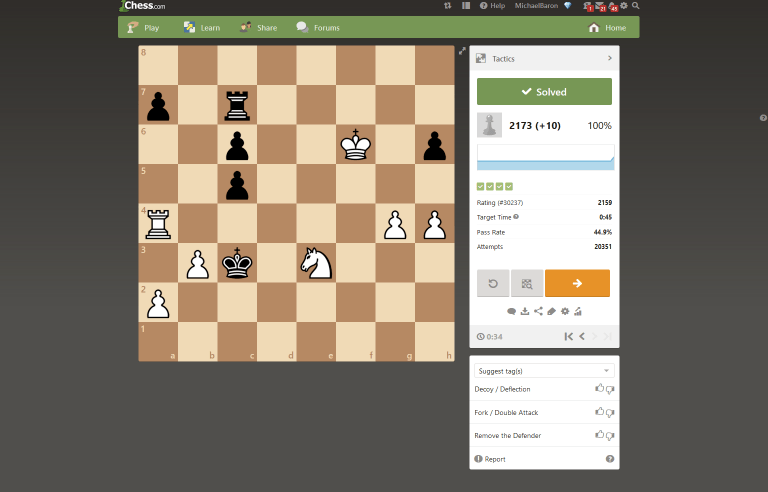Improve Interactivity Of The Learning Management Systems With The Use Of Chess Server Technologies
Development of state-of-art LMSs (Learning Management Systems) and LMPs (Learning Management Platforms) has traditionally been attributed to large training organizations that deliver either academic programs, such as university degrees, or industry certifications. However, when it comes to identifying new, unorthodox ideas for eLearning, we can sometimes learn from providers of "alternative online learning services" such as chess-playing, and chess-training servers. Some of the technologies and patterns used by the chess servers could be utilized equally effectively within academic settings.
Below are 2 examples of how the chess eLearning technologies can be tailored to enhance university and industry teaching programs by arming them with additional eLearning tools.
1. Ranking Systems (Live Performance Ratings)
Problem solving (quizzes) is one of the most common eLearning patterns for many of the online courses and… the chess servers! Surprisingly enough, the chess versions of the interactive quizzes tend to be far better developed and managed than the standard academic one!
The snapshot below has been taken from Chess.com – one of the most popular chess servers worldwide (ability to attract worldwide audiences is yet another distinct feature of the chess servers, as opposed to many of the universities that struggle to promote their programs internationally, despite 100% online delivery mode). It highlights one feature of the chess quizzes that would be capable of increasing popularity of any of the online courses dramatically, namely Live Performance Ratings (LPR):

Quizzes offered by the chess servers usually allow the learners to select a level of difficulty that they believe is appropriate to their needs. Therefore, the learners are empowered to adjust the eLearning settings to their level, and control the pace of learning. Advanced learners do not have to waste time on solving trivial chess problems. On the other hand, beginners can start learning chess literally from scratch, by attempting to tackle simple chess problems first.
The role of the LPR is instrumental in improving the learning environment -both in terms of learning effectiveness, and popularity with the learners- by killing two birds with one stone:
- Firstly, by giving learners a fairly objective idea about their level of play (aka grading).
- And secondly, by allowing them to compete with other learners on the server worldwide, and to monitor their progress.
Within the chess communities, ratings are regarded as the best indicators of one’s level of play/competence in chess. There is no reason why the same eLearning technologies and patterns could not be used effectively in other fields, such as online university courses that are teaching Maths, Physics, Chemistry, or any other sciences. The eLearning system developers can easily draw upon the current LPRs of the chess servers, and "transfer" the features outlined above to the LMS and LMP that are currently in use, not to mention using LPR for the new eLearning developments.
2. Online Analysis Boards
If two or more chess players want to analyze a game together using a chess server, it can be done by going into the "Analysis Mode". Each of the participants to the "Analysis" can suggest moves to be played, as well as move pieces on the interactive chess board that is being shared. On the chess servers, the "Analysis" tool is used for both chess tutoring -giving/receiving chess lessons from instructors-, and self-study. Both functions appear to be working without any visible hazards!
Given both effectiveness and popularity of the interactive analysis boards with the chess players, and the essentiality of interactivity for any LMS, I can see a lot of potential benefits in development of similar "Analysis Rooms" for other fields of learning. Trivial examples could include creating various live documents which can be discussed with instructors and peers, as well as be edited (e.g. Gantt Chart for students of Project Management or Profit and Loss Report for students of Accounting).
Therefore, it is quite evident that the chess learning technologies can, and should be, used well beyond the chess scene, but their implicit value is yet to be fully appreciated by the eLearning developers. Hopefully, both the LPR and the "Analysis Rooms" will soon become regular features of the online courses!









